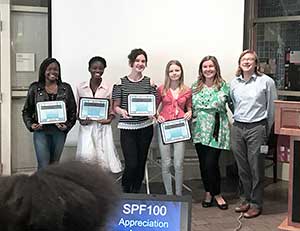
Somerville Prevention Force students are doing their part to inspire others to avoid substance abuse. — Photo by Lovelee Heller-Bottari
By Ian Erlichman
A kid in a tight black t-shirt rolls up to Somerville High School on a hand-me-down mountain bike. After a quick pause, thick white plumes of smoke, the type that wet leaves and cigarettes make, billow up and away from his head with the Wednesday afternoon wind.
The annual SCAP (Somerville Cares About Prevention) meeting casually begins at 5:30 p.m. on June 6 at the Somerville High School Highlander Café with many student leaders and proud parents fluttering in and out of its flyer-covered doors. The pathway leading to the café is lined with posters, merchandise, and bright young faces eager to inform about the dangers of alcohol and drugs.
The atmosphere is reminiscent of a science fair, with baking soda volcanos replaced by striking drug and alcohol statistics. One station outlines a significant change in SHS student substance use.
The 3-fold poster reports that from 2002 to 2016, student alcohol usage dropped 24 percentage points. During that same period, cigarette use plummeted to a quarter of 2002 levels, and marijuana use nearly halved.
This progress has been earned through years of student activism and store-by-store monitoring. The impact speaker of the event and Director of the 6 City Tobacco Control Initiative, Bonnie Carroll, repeatedly said that “prevention is the goal.”
Keeping this in mind, Somerville Prevention Force (SPF) students set out to spread awareness: targeting the Somerville community, and their peers alike. One initiative, called the Sticker Shock Campaign, sent SPF students out into the city where they “went to liquor stores and put stickers on wine and beer,” according to Michael, an SPF Junior Leader.
Michael also attended another major SCAP event called Kick Butts Day, in which SPF students wrote messages on the school’s sidewalk, aiming “to remind people not to smoke.”
SCAP seems to have combined community activism and peer education with a potent result. One goal for SPF leaders is to decrease something Lovelee Heller, the program’s director, calls “indirect peer pressure.” Bonnie Carroll echoed this mission when she stated teen attraction to smoking begins, in part, because “everybody’s doing it.”
SCAP is attempting to change the social norms around smoking and drinking, both in and outside of Somerville High School. And it seems like they are succeeding.
SCAP has even taken Somerville’s diverse ethnic composition into account. With a roughly ten percent Asian population, close to nine percent Hispanic, six percent Black, and an above average number of Portuguese speakers, Somerville is host to many different walks of life.
To acknowledge this, seven different languages are included on the Sticker Stock Campaign’s labels. “We have a very diverse community and some countries may have different customs with a lower drinking age,” says Director Heller.
Heller’s mission to “change norms about drugs and alcohol” works because SCAP has such a strong peer-to-peer influence between SPF students and their contemporaries. Conversely, SCAP’s Tobacco regiment, led by Bonnie Carroll, actively monitors community business owners to ensure they abide by Massachusetts’s Tobacco Availability laws.
Carroll has ensured that “In Somerville, you cannot purchase smoking implements unless in a 21+ only smoke shop.” All convenience stores and gas stations have been plucked of their pieces, pipes, and papers, ensuring potential underage drinkers can’t make it past the door.
However, local Somerville Store owner Rahm, says the number of underage kids attempting to buy alcohol with fake IDs has been steady throughout the years. However, he also says, “nowadays they send somebody else.” Inferring that kids use older friends or relatives to buy the alcohol for them.
SCAP is already battling this front by attempting to challenge larger societal norms. “It’s about changing norms around alcohol and drugs for not only kids, but also their parents,” says Director Heller. SCAP is striving to educate the Somerville community on the particular dangers associated with underage abuse of alcohol and drugs.
SCAP’s efforts have resulted in positive changes educationally, with a shrinking level of youth substance abuse. When Director Heller started, 14 years ago “there were only 20 or so clubs.”
“Now,” Heller says, “they fill half the gymnasium. There has been a positive change in extracurricular activities with less substance use.”
It is a long road SCAP has in front of them, but they are making significant strides. As for the high schooler on the mountain bike and the black slayer t-shirt, have a talk with SCAP’s Director Lovelee Heller at (617) 625-6600 or email her at lheller@somervillema.gov.















Reader Comments